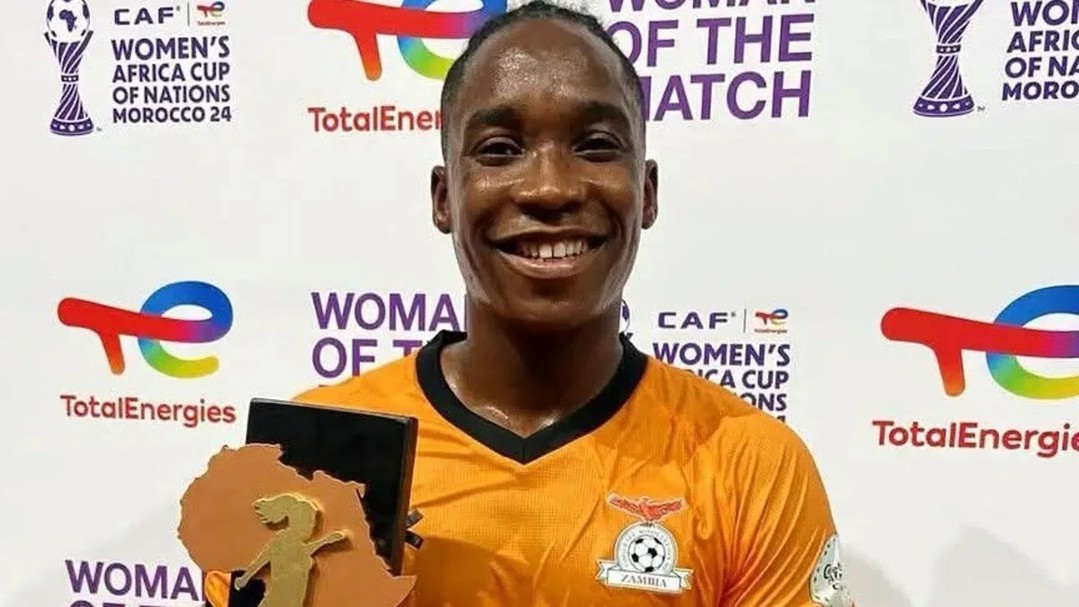Under the floodlights of Rabat, the Copper Queens met the Atlas Lionesses and the stadium shook with anticipation as WAFCON 2024 kicked off. Within 58 seconds Zambia’s captain Barbra Banda stunned the hosts with a low left‑foot finish, and a breathless 2-2 draw followed that announced her long awaited debut on Africa’s biggest stage. The scoreline said parity, the performance said presence.
Banda arrives at last
It felt paradoxical that a global star of African women’s football had never played a minute at the Women’s Africa Cup of Nations. Banda’s first finals appearance banished that quirk with authority. Constantly on the move, she dropped in to link, spun out to threaten in behind, and demanded the ball in every pocket of space.
Her impact was immediate and relentless. She drew the most fouls in the match, five in total, and attempted a game high six shots. The opener was a lightning transition sparked by Margaret Belemu, then dispatched with precision into the side netting. Banda’s reaction was telling, barely a celebration, just the cool gaze of a striker who knew the real work was only beginning.
The Moroccan crowd roared their team forward and the hosts twice found equalizers, yet Zambia refused to fracture. The Copper Queens stayed connected and defiant, a tone set by their captain’s composure. Before kick off, head coach Nora Häuptle had framed Banda’s influence simply.
She is a complete player, a true leader. Her presence gives courage to the whole team.
A boss on opening night
Beyond the numbers, Banda’s attitude stood out, calm, insistent, unflinching in contact. Teammate Ireen Lungu captured the essence of the moment when she said Banda embodies the evolution of African women’s football, a higher pace that forces her team to raise their level. The message was clear, the captain is here to shape this tournament.
At the final whistle she held the TotalEnergies Woman of the Match trophy and spoke with the same assured tone that marked her play. We still have a lot to improve but this match shows that we are ready to fight until the end. For Zambia, the path rises quickly now, with Senegal then the Democratic Republic of Congo ahead in the group, and with every opponent calculating how to slow a forward who refuses to stand still.
The heartbeat behind the goals
Banda’s WAFCON debut sits on top of a mountain of milestones. She was the first player to score two consecutive hat‑tricks at the Olympic Games, a feat that announced Zambia on a grand stage and announced her as a finisher for the ages. She tucked away the 1000th goal in FIFA Women’s World Cup history against Costa Rica, and she brought that hunger to the United States, shining with Orlando Pride in the NWSL.
Yet if you ask her where she draws strength, she points homeward. African Women’s Player of the Year in 2024, Banda is also her country’s all time top scorer, and she frames every stat inside a collective. She reminds anyone listening that a striker’s tally is the sum of a teammate’s pass and a team’s effort.
I am African, this continent is my foundation. Playing here is natural, it is home.
Her sights are set on the title. Last time, Zambia finished third. This time, as she put it, they want to go all the way. The group is unforgiving with Morocco, DR Congo and Senegal, and she embraces that difficulty, the challenges are exactly what she welcomes.
Super Falcons focus with Nnadozie in command
On the other side of the bracket of favorites stands Nigeria, and at the core of their bid is Chiamaka Nnadozie. Twice named Africa’s Best Goalkeeper, the Super Falcons captain carries a mix of calm and authority that turns tight margins into victories. At just 24 she is a reassuring presence, and her resume reads like a series of interventions that changed stories.
In May of last year she helped Paris FC lift the Coupe de France for the first time, a 0-0 draw with Paris Saint-Germain decided 5-4 on penalties, where she saved two spot kicks and produced a decisive late stop. At the 2023 FIFA Women’s World Cup she faced Christine Sinclair from the spot and saved, a moment that sent a message beyond Africa that Nigeria had a world class last line of defense.
This AFCON is a mission to reclaim what is ours. We must treat every opponent with seriousness, no one can be underestimated anymore.
Nnadozie’s respect for the competition is forged in defeat as much as triumph. In 2022 Nigeria lost the title in the semi final to hosts Morocco after a penalty shoot out. The legacy remains heavy, 11 continental crowns frame expectations, and she insists on turning pressure into fuel. Nigeria’s Group B with Tunisia, Algeria and Botswana looks manageable from a distance, but as she noted, women’s football across Africa has surged, and qualifiers must be earned.
Her leadership extends beyond clean sheets. She speaks about discipline and humility as foundations, about welcoming young players, and about the responsibility of an armband that represents generations of Super Falcons who won everything. She wants to add her own chapter, on the pitch, lifting the trophy as a starter.
The legacy that lights the path
Every WAFCON edition crowns a queen, and the lineage is rich. The turning point came in 2004 when the Best Player of the Competition award was first handed out, and it went to Nigeria’s Perpetua Nkwocha, who defined dominance with nine goals. She would be honored again in 2006 and 2010, a six time African champion and four time African Player of the Year whose imprint still shapes the stage.
Behind Nigeria’s iron grip on the trophy, others rose. South Africa’s Portia Modise took the prize in 2006. Equatorial Guinea’s Genoveva Añonma exploded in 2008, then again in 2012. Stella Mbachu earned recognition in 2010, a reminder that the Super Falcons’ greatness is multigenerational. The narrative bent toward an heir in 2014 when Asisat Oshoala stepped forward. By 2016, Gabrielle Aboudi Onguéné led Cameroon to the final, then in 2018 Thembi Kgatlana electrified the competition, Best Player and Best Scorer in the same year. In 2022, on home soil, Morocco’s Ghizlane Chebbak became the heartbeat of a finalist, scoring, creating and leading as the tournament MVP.
Best players of the tournament since 2004
- 2004, Perpetua Nkwocha, Nigeria,
- 2006, Portia Modise, South Africa,
- 2008, Genoveva Añonma, Equatorial Guinea,
- 2010, Stella Mbachu, Nigeria,
- 2012, Genoveva Añonma, Equatorial Guinea,
- 2014, Asisat Oshoala, Nigeria,
- 2016, Gabrielle Aboudi Onguéné, Cameroon,
- 2018, Thembi Kgatlana, South Africa,
- 2022, Ghizlane Chebbak, Morocco.
Oshoala’s arc is the tale of a torch passed with elegance, a six time African champion and six time African Player of the Year who moved from continental star to global icon while lighting up Europe at club level. Kgatlana’s 2018 was a blaze of ambition, and Chebbak’s 2022 surrounded by a surging Moroccan project showed how a host can accelerate growth and belief.
Why this edition feels different
There is a shared recognition across the interviews and the opening night, the continent has caught up with its standard bearers. Banda’s post match tone and Nnadozie’s pre tournament caution point to the same truth, no opponent can be taken lightly, and the margins are thinner. Investment, development and belief have narrowed gaps, and the tournament is better for it.
That context raises the stakes for every lead and every save. Zambia’s refusal to wilt under pressure in Rabat aligns with their striker’s insistence on collective effort. Nigeria’s quest for redemption aligns with their captain’s habit of standing tall when it matters most. The human thread is perseverance, the sporting translation is a higher floor and a more dramatic ceiling.
Inside Zambia’s evolving project
Banda has been clear about the team’s internal shift. She saluted former coach Bruce Mwape for taking the program into major tournaments, then embraced the ideas of new head coach Nora Häuptle, who is adapting to the team’s culture and installing her vision. Friendly matches, including one against Malawi, have helped build chemistry and clarity.
The group stage will test that work, not least a renewed meeting with Morocco on their home turf. Banda refuses to lean on past results. She sees a different match in front of a passionate crowd, and she welcomes the challenge. Zambia are playing to make history, and they know exactly how hard that will be.
Nigeria’s mindset for Group B
Nnadozie does not sugarcoat the responsibility that comes with wearing the Super Falcons shirt. She references the spotlight and the criticism that can follow a rare defeat, then returns to basics, hard work, discipline and humility. She mentions how even the most routine group can turn complicated in a heartbeat, a reality Nigeria have faced in recent years.
Her leadership shows up in small moments, a word to a young teammate, a lesson about watching and learning even from the bench, a reminder that consistency matters as much as any one spectacular save. It is the everyday that prepares a team to handle the extraordinary.
What to watch next
- Banda’s influence in transition, can Senegal and DR Congo slow her first steps and deny service,
- Nnadozie’s command of Nigeria’s penalty area, clean sheets in a tricky group would send a signal,
- The home lift for Morocco, as the crowd in Rabat continues to animate the tournament.
Final word
The opening chapter in Rabat offered a powerful reminder of why this competition matters. A star finally touched the stage built for her and delivered in the first minute. A champion goalkeeper spoke with clarity about legacy and responsibility. The past queens stretched out behind them, not as nostalgia, but as markers of a path that invites the next step.
WAFCON breathes the history and hunger of a continent. This edition gathers the electricity of Banda’s finishing and the serenity of Nnadozie’s gloves, and it places them in a field that refuses to settle for old hierarchies. The tournament has only just begun, and already it feels like a story that can carry both memory and momentum.





